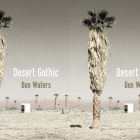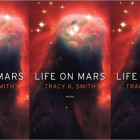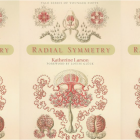Small Press Spotlight: Canarium Books
As I said in my previous blog post about the most intriguing small presses publishing poetry, I really think small presses are publishing some of the really interesting poetry out there right now. I had the good fortune of speaking with Joshua Edwards, the editor of Canarium Books. He seems like a really fascinating person and I enjoyed our conversation.
-How would you describe your background beyond the typical bio to someone like me who has never met you? Said another way, what would your friends and enemies say about you?
If I ever write a memoir, it’ll be about other people. The most interesting things about me are my friends and family, and I’m sure I’ll someday be a footnote in some heavy biographies—I might even get a chapter or two in books about my Canarium co-editors, Nick Twemlow, Robyn Schiff, and Lynn Xu. I met Nick and Robyn a decade ago in Oregon, and they’ve been my mentors, confidants, and collaborators ever since. For six years before we started Canarium Books, we ran a magazine called The Canary with our friend Anthony Robinson. In one issue we published an amazing poem by Lynn, who I met years later and now she’s my better half. Not only because of the fortuitous ways I met Lynn, Tony, Nick, and Robyn, but for lots of reasons, my friends would probably say I’m a very lucky person and that I’m often at the right place at the right time. They might also say that I’m always on the move. I was born in Galveston, raised in Clear Lake Shores, and I’ve since lived or spent a good amount of time in Eugene, Boston, Ecuador, Kansas City, Mexico, rural Washington, Nicaragua, Tuscaloosa, Philadelphia, Ann Arbor, New York, Chicago, China, Germany, and Berkeley. At the end of September, Lynn and I will move back to Germany for a year, after which we hope to settle in Marfa. My enemies may say I’m geographically elusive and too lucky by half.
-What’s the vision of your press?
I really like the word vision because for me a vision comes from the future, it can’t be dissected and it can’t be ascertained. A dream can be interpreted, but a vision seems to attach itself to someone or something and pull with mysterious force. I think Lynn, Robyn, Nick, and myself have clear ideas for the press, but the vision of Canarium exists in the books, and they pull us along behind them.
-How did Canarium start and why are you personally drawn to editing and publishing versus just writing?
My mom’s a librarian, my dad’s a photographer, my sister dances and plays music, and I fell in love with literature. I’ve always found books to be the most compelling objects in the world, and I guess I began writing as a way to travel toward books. Somewhere along that journey poetry took hold. After college I got serious about “becoming a poet,” and after two years of devouring books and poorly imitating Symbolist, Cubist, and Latin American poets, I decided to start a journal. At the time it seemed like the only way to learn what I thought I needed to know and to enter contemporary culture (I had been living a pretty isolated existence in rural Washington for the better part of two years while working at Mount Rainier). It didn’t hurt that I had no idea what I was getting myself into. As luck would have it, right off the bat a friend’s father offered to help out with printing costs and then I got a grant. Once the journal was up and running, everytime I knocked on a door an amazing person opened it. After a short while it didn’t matter much that I didn’t know what I was doing, the inertia was there and great people were helping me.
-I love what you say about the poetry you publish as “constellation and community.” But sometimes the poetry world feels more like consternation and competition to me 😉 Tell me more about this view… I’d love to get on your bus.
Editing has me constantly thinking about poetry as a layered conversation (something Eavan Boland also talked a lot about when I was at Stanford), and although it can be frustrating to have history, arguments, stories, gossip, retractions, quotations, aesthetics, etc. hanging over one’s head while attempting to commune with a blank piece of paper, art of course demands tension as well as attention. “Constellation” and “community” might be the generative versions of tensions that also emerge as “competition.” The overlap of the poetry community and academia is obviously a big topic at play here, but I’m rather naïve because I’ve never applied for a tenure-track job and I spend a lot of time living abroad. It seems that when competition is in the foreground of writers’ lives, some debilitating anxiety can result. On the other hand, there are so many amazing creative communities at universities. I think my positive take on the academic aspect of the writing world is largely thanks to the great times I had as a member of communities at the University of Michigan and Stanford. I have my fair share of consternation also, but its root is usually existential.
-What is your submission process for poets and translators? Do you ever plan to enter the ubiquitous territory of contest submissions? Why or why not?
We have an open reading period for poetry, usually in October, and we read translation manuscripts year-round. Students from the University of Michigan MFA program help us go through manuscripts, and we basically all just talk it over for several months. We also keep an eye out for interesting work in magazines, and we occasionally solicit a manuscript. We’re lucky to have a printing budget from UM, and that helps us avoid reading fees and such. A lot of presses I love have contests, but it’s not something we’re interested in. We want to stick with our authors, we want to decide what goes onto our list, and we don’t want to charge people to read their manuscripts.
-Do you do print runs? If so, how many copies do you typically print for each book?
Our first printings are typically 1,000 copies, or 750 for translations, and a couple of our books (The Irrationalist and The Waste Land and Other Poems) are in second printings.
-Your books are beautiful as physical objects. What’s that process like? I noticed the same designer listed in all of your books. Are you an artist or designer yourself?
I’m thrilled you like the look of the books! We basically just ask our authors, “What do you want?” If they have an idea but no art for it, we try to keep things as close to home as possible. Lynn did the watercolor for Union! (she’s an amazing painter), I used a drawing of mine for The Irrationalist, and the cover of Moving Day is one of my dad’s photographs. So yeah, I do the layout and design work under the moniker Gou Dao Niao, “Dog Island Bird,” which traces the interesting etymology of the word “canary” from islands named for their dogs to birds named for their islands. I wouldn’t call myself a designer, because I only do our books and the occasional commission, but I love making books and I’d love to do more of it.
-So many small presses don’t make it over the long-run; assuming perpetuity is a positive thing for any art, do you ever worry about the future of Canarium?
I’m not much of a worrier. I’d like to keep Canarium going for a long time, but there are lots of publishers out there and someone would pick up the torch. The authors are the essential aspect of the press, the rest, as Amelia Earhart would say, is merely tenacity.
-I recently read to a few hundred wiggly high school students. How do you reach your readers in this age of media proliferation?
We do our best to promote our books through reading tours, book fairs, and social media, but in the end it remains a mystery. Sometimes a collection strikes a chord.
-Do you ever accept manuscripts from the slush pile of people you’ve never heard of? And how many submissions do you typically get?
Quite a few Canarium authors were contributors to The Canary (we published more than 200 people over the course of its six issues), because that was the initial pool that we sent out our open reading period notifications to and such. We’ve definitely also published manuscripts from people whose work we first encountered in their submission. For example, Anthony Madrid’s manuscript came in over the transom to wow us; I might have read a couple of his poems here and there before that. We get between two and three hundred manuscripts each reading period, and all of those are read by at least one of the four co-editors as well as an editorial assistant or a managing editor.
-Does editing ever impede your own writing? I imagine you are busy. Do you have a day job and if so, what is it?
I’m obsessive about editing, so it likely takes up a bit of mind space that would otherwise be for writing, but I’m sort of a procrastinator with my own work and I write in bursts, so I think in the end editing helps a whole lot more than it impedes. As for the rest of my time, right now I work as a lecturer at Stanford and I do some freelance editorial work. I taught English in Shanghai the year we were there, but mostly I’ve been crazy lucky with fellowships–Fulbright, Stegner, Meijer (University of Michigan), and I’ve got a year-long thing coming up in Germany. As Baudelaire wrote in My Heart Laid Bare, “I have grown, for the most part, by means of leisure.” I’m sure the debts he also wrote about will someday find me, but so far, so good. I do like teaching and fellowships are great, but I’d really love to make a living as an editor.
-How would you describe your personal aesthetic taste?
My taste is all over the map. I tend to like lyrical work with strong vision, voice, and style. If I made a list of the poets who have influenced me the most, it would begin with Celan, Vicente Huidobro, Anne Carson, Li Bai, Emily Dickinson, Kenneth Rexroth, George Oppen, Elizabeth Bishop, and John Ashbery, but it would end with my friends, and the best thing about editing the press is that through it I’ve been able to befriend our authors.
-I love that your books are long, there’s a certain freedom to that. I hate those arbitrary page numbers people give poetry books.
We do have a bunch of long books, don’t we? I guess they don’t seem that way when I read them.
-Would you say the press came out of a desire to make books or a desire to fill an aesthetic void in poetry publishing or both or neither? You sort of already answered that.
I’d say both, although I don’t think it was so much a question of an aesthetic void as there were amazing poets we’d published in The Canary whose first books we wanted to read. Ish Klein definitely played a big part in our decision to start the press. We’d published her work in the journal and we sorta collectively said “These poems are too good to not be in a book.” Her first collection Union! was one of our first two publications, and we published her second book, Moving Day, in 2011.
-What are the most exciting and interesting presses small or large in your opinion?
So many presses are doing great things, it’s really tough to make a list. Burning Deck and New Directions are still essential after all these years—without them I don’t think my mind would exist. Most of the fiction I read nowadays is from Dalkey Archive and NYRB Classics. Especially close to my heart are Noemi (which published my first book), Omnidawn (which will publish Lynn’s first book), and Green Lantern (which will publish Nick’s first book). Tavern Books is a great young press that publishes translations and revives out-of-print work. As a publisher, I’m really interested in the organizational and aesthetic development of independent presses that are a bit larger than Canarium, especially those whose books I consistently love—Ugly Duckling, Coffee House, Wave, and Graywolf among them. In one version of the future, Canarium is that size and I run it and a small non-profit art space as my job. “Fanatics have their dreams . . .”



